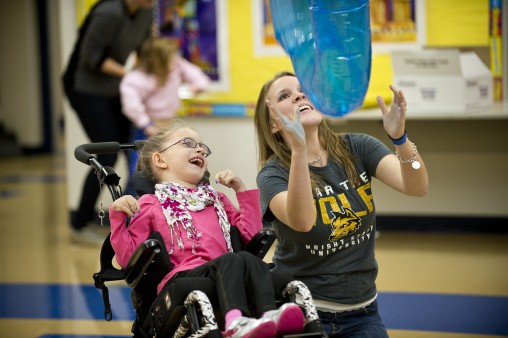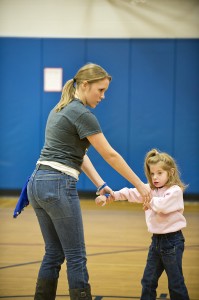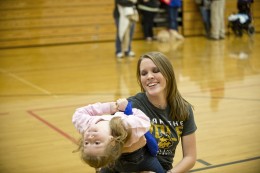
Wright State University graduate student Morgan Ruppert and 10-year-old Brooklyn Vanskoyck at Miami Valley Adaptive Color Guard (MVACG) practice.
Morgan Ruppert had devoted a few minutes to unsuccessfully attempting to inflate a round blue pool float when she realized a small hole in the ring had been negating her efforts.
“We’ll just do the best we can with what we’ve got,” Ruppert said, shrugging her shoulders.
She helped 7-year-old Leah Anderson out of her wheelchair, then dropped the partially inflated float over the child’s head and onto her shoulders. Ruppert held Leah’s hand as they began to walk in a circle. Leah’s facial expression changed from a grimace to a grin, then an ear-to-ear smile.
“Leah loves color guard practice,” said Staci Anderson, Leah’s mother. “The first time I brought her, she cried through the whole practice. But, to Morgan, it was no big deal. She kept working with her and got her through it. Now color guard has become a big part of Leah’s life.”

Ruppert enrolled in the Intervention Specialist graduate program at Wright State’s College of Education and Human Services this fall, she said, because of the university’s dedication to campus accessibility and its excellent faculty.
Ruppert, a Wright State graduate student, is assistant director of the Miami Valley Adaptive Color Guard (MVACG). Ohio’s first and only special needs color guard includes children, teenagers and young adults affected by developmental disabilities. Their challenges include Down syndrome, spina bifida, autism and growth disorders.
There are 15 members in the program, double from 2012–13, the color guard’s first season. Some are not able to manipulate large flags; they instead utilize more manageable items like pool floats and smaller flags that attach to the wrist.
Ruppert found her true calling through working with the color guard after having earned her undergraduate degree in communication and political science at Ohio University, then working in human resources for a year.
She began to substitute teach, primarily in special education classes, and spent the summer of 2013 working at a camp for special needs children. Ruppert enrolled in the Intervention Specialist graduate program at Wright State’s College of Education and Human Services this fall, she said, because of the university’s dedication to campus accessibility and its excellent faculty.
“Morgan is a wonderful advocate for people with disabilities and a rising star in our graduate teacher education program,” said Jason Fruth, Ph.D., director of the Intervention Specialist program.
Cathy Barnes-Miller was the Miamisburg High School color guard director when Ruppert was a member. When Barnes-Miller asked Ruppert if she would be interested in helping out with the first MVACG season, the immediate reply was, “Let’s go for it. I’m in.”
She certainly was.
Ruppert helped prepare and pass out flyers, contacted potential donors and participants through friends and relatives, sewed costumes and made or modified performance props. She also volunteered to work with the team’s most severely handicapped members.
“I used my lunch breaks at work to make flags,” Ruppert said. “I found myself leaving early because I was so anxious to get ready for practice. That’s when I knew my future was in something other than human resources.”
Ruppert devotes roughly half of each one-hour practice session to working with Leah Anderson and Brooklyn VanSkoyck. Anderson is globally developmentally delayed due to severe epilepsy. VanSkoyck, 10, is battling Canavan disease, a rare neurological disorder.
“Morgan’s patience is unbelievable,” said Beth VanSkoyck, Brooklyn’s mother. “If Brooklyn can’t do what she’s asking, Morgan will adjust it until she can. (Brooklyn) has had such a positive reaction to Morgan. She loves being here.”Ruppert loves the promise her new career path offers.
“Helping a student overcome a disability is just a matter of finding out what that student needs to succeed,” Ruppert said.
“Kids who are profoundly challenged are turned away from so many opportunities, yet each of these kids is so unique, so amazing. They have so many talents I want people to see. It has been easy for me to pour myself into helping them. I can’t imagine anything more rewarding.”
Learn more:


 Wright State alum Lindsay Aitchison fulfills childhood space-agency dream
Wright State alum Lindsay Aitchison fulfills childhood space-agency dream  Wright State business professor, alumnus honored by regional technology organizations
Wright State business professor, alumnus honored by regional technology organizations  Wright State University Foundation awards 11 Students First Fund projects
Wright State University Foundation awards 11 Students First Fund projects  Gov. DeWine reappoints Board Treasurer Beth Ferris and names student Ella Vaught to Wright State Board of Trustees
Gov. DeWine reappoints Board Treasurer Beth Ferris and names student Ella Vaught to Wright State Board of Trustees  Joe Gruenberg’s 40-Year support for Wright State celebrated with Honorary Alumnus Award
Joe Gruenberg’s 40-Year support for Wright State celebrated with Honorary Alumnus Award 